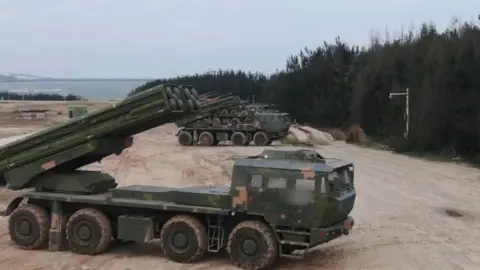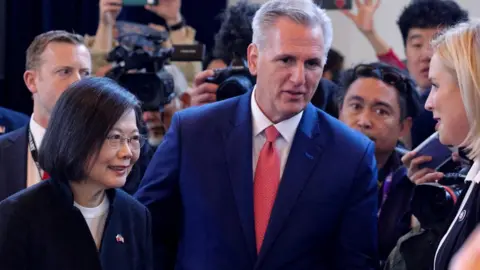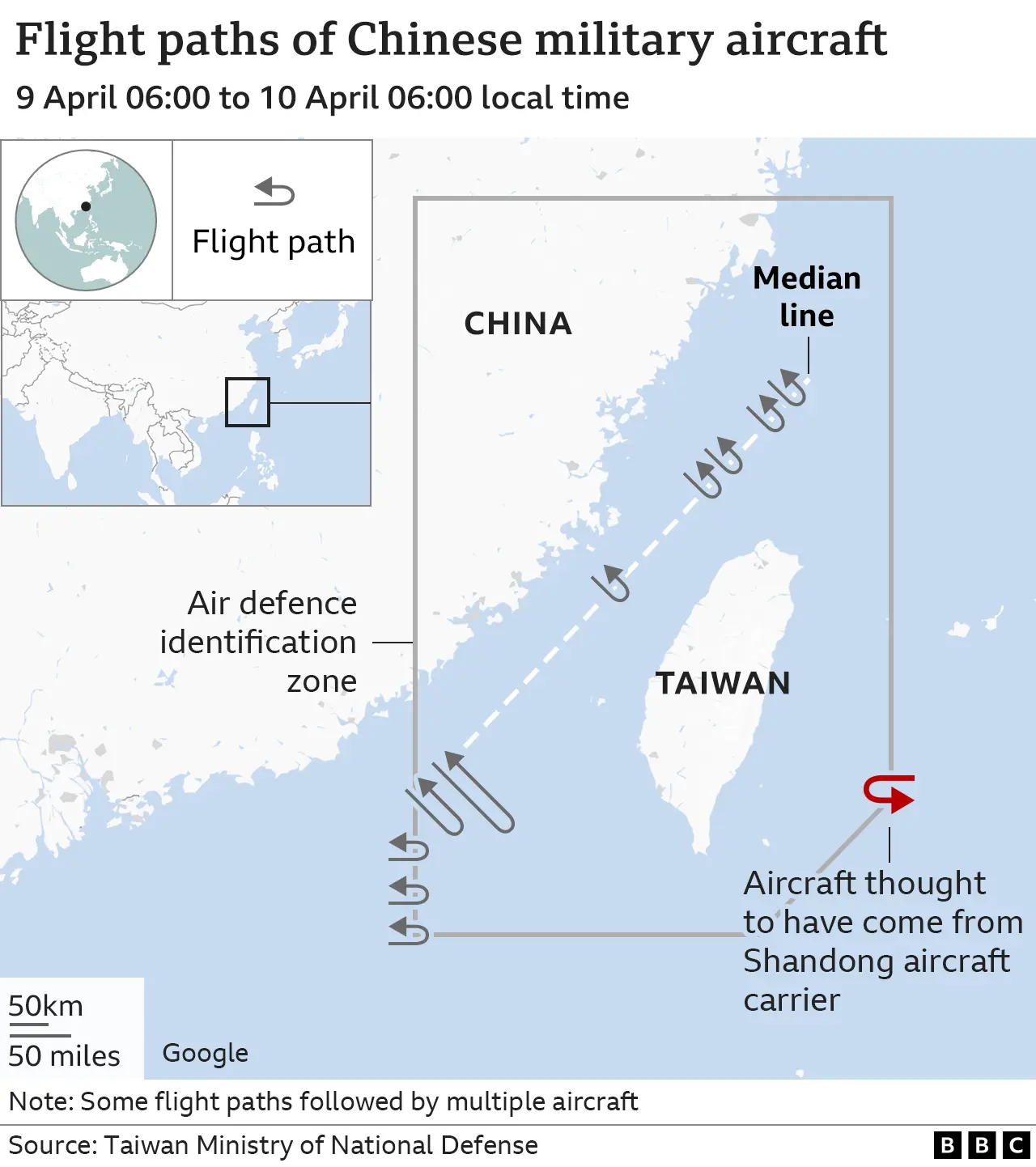China-Taiwan: How Beijing calibrates its Taiwan response
 HANDOUT
HANDOUTChina has again been staging military drills around Taiwan - but some experts say Beijing has dialled them down as the island will hold a presidential election in nine months, and it is in China's interest to see a victory by the opposition Kuomintang party (KMT).
No missiles have been fired near the island, the drills only lasted three days and the US politician who met President Tsai Ing-wen - House Speaker Kevin McCarthy - has not been sanctioned.
Beijing's response when ex-speaker Nancy Pelosi visited Taipei last August was harsher.
The drills have become part of China's "standard operational procedure" after Ms Pelosi's trip, says Professor Chen-shen Yen of Taiwan's National Chengchi University. "They need to make their position known, but their reactions cannot be overboard."
Timing is key.
The Chinese Communist Party defeated the KMT in a civil war that ended in 1949, forcing the latter to flee to Taiwan. But in recent decades, the former rivals have found common ground in the 1992 Consensus, a vaguely worded understanding that says there is only "One China" which includes Taiwan.
If Beijing continues its hard-line rhetoric, it risks becoming the best campaigner for the independence-leaning Democratic Progressive Party (DPP) in the election, Prof Yen says.
The KMT won big in last year's local elections, but analysts say the China factor weighs much more in presidential elections.
China has adopted a carrot-and-stick strategy, says Professor Fang-yu Chen of Taiwan's Soochow University. On one hand China promises exchanges - including economic and cultural - if Taiwan agrees on the "One China" principle. At the same time it continues its military build-up.
"Beijing wants to tell the Taiwanese people that there will be a war if they vote for the DPP, but there will be peace if they vote for the KMT," he adds.
It is an uneasy balance to strike. However, China also faces internal pressure to act tough towards Taiwan, especially given that China has been stoking nationalism among its citizenry, he says.
 Reuters
ReutersIf China's military exercises aim to deter US and Taiwanese politicians from getting too close, it has achieved some success - Taiwan appears to have taken steps to reduce tensions around the Tsai-McCarthy meeting.
Last July, Mr McCarthy said he would like to lead a congressional delegation if he became the house speaker. The Tsai administration managed to convince him to meet in the US instead because of Taiwan's security concerns, the Financial Times reported, quoting sources.
The US also tried to downplay the meeting, pointing out that it was Ms Tsai's seventh transit since taking power. Both the US and Taiwan have described it as a stopover or transit, rather than a "visit".
"The US and Taiwan have developed a tacit understanding that they should take a low profile," says Prof Chen.
It is still a win for Taiwan, he says, as Mr McCarthy was the highest-ranking US official any Taiwan president has ever met on American soil since 1979, when the US severed diplomatic ties with Taiwan.
The Taiwan issue is the biggest flashpoint in the US-China relations. China sees the democratic self-governing island as part of its territory and has not ruled out the use of force to take control of it.
As the US shows greater support for Taiwan, China has accused it of hollowing out its longstanding One China policy.
Under the policy, the US recognises and has formal ties with China rather than the island of Taiwan, which China sees as a breakaway province to be unified with the mainland one day.
But this is distinct from the One China principle, whereby China insists Taiwan is an inalienable part of one China to be unified one day.
The US policy is not an endorsement of Beijing's position and indeed as part of the policy, Washington maintains a "robust unofficial" relationship with Taiwan, including continued arms sales to the island so that it can defend itself.

Last year President Joe Biden repeatedly said the US would intervene to help Taiwan if China attacked it, statements seemingly at odds with the US official posture of ambiguity.
As part of its recalibration of its own forces in Asia, the US will carry out its biggest-ever joint naval exercises with the Philippines starting on Tuesday.
The US has also secured access to four additional Philippine bases in the South China Sea, with three of them relatively near Taiwan.
In Taiwan itself, people have remained calm as the drills practising striking targets and "sealing off" the island have taken place - just as they did during August's military manoeuvres.
But Professor Yen is worried that the island may be lulled into a false sense of security.
Recent escalations have seen Beijing's warplanes and ships pass the median line, the unofficial dividing line between Taiwanese and Chinese territory that was respected by both sides for almost 70 years.
"China may continue the drills in the future and Taiwan won't know how to respond if it attacks one day," he says.
